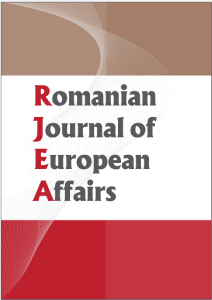In the Autumn issue of the Romanian Journal of European Affairs, the contributors bring forward topics concerning: rethinking the European Union – from unity in diversity to diversity in unity; the national construct of the European concept in the political and cultural life of Romania in interwar period; a comparative analysis of minimum income guaranteed schemes within the member states of the European Union; the changing nature of security in Europe; Ukraine in the WTO; a review of Europolity Journal and a book review of the „Two-speed world: emerging powers and developed countries”.
Rethinking the European Union: From Unity in Diversity to Diversity in Unity
Florin Bonciu
Abstract:
Placing the current European Union crises (among them being the Euro crisis, the Greek crisis and the economic crisis) into a long term perspective and taking into account the characteristics and consequences of the globalisation process, the author presents arguments to support the idea of a new approach regarding the very essence of the European integration model. This new approach is based on an evolutionary perspective of the European Union in which all that has already been achieved is used while the philosophy of the institutions and of the legal framework is reinterpreted by changing the accent of the European Union motto from “Unity in Diversity” to “Diversity in Unity”. The conclusion of the paper is that European Union needs to reconnect to its own realities and that, by accepting diversity in its existing unity rather than enforcing unity upon diversity, it can alleviate existing tensions, reconnect to citizens, restart innovation and creativity and find a better place in the global context.
Keywords: globalisation, balance of power, European Union, structural changes, redefining the Treaty on the EU and the Treaty on the functioning of the EU, integration phenomena, unity in diversity, diversity in unity, flexible unity
La Construction Nationale du Concept Européen dans la Vie Politique et Culturelle de la Roumanie de L’entre-deux-guerres – La Première Moitié des Années 1920. Le Grand Débat. Prémisses Introductives
Mihai Sebe
Abstract:
This paper presents a short synopsis of the development of the European idea in the early 1920. In a time of great transformation the Romanian elites are having themselves a series of debates whether to engage in the construction of a national ideal and of nation-building after the creation of Greater Romania or whether to get involved in the European debate regarding the creation of an European construction. It is a time of great intellectual effervescence that will shape the entire period between the two World Wars.
Keywords: Greater Romania, European Union, history of the European construction
Comparative Analysis of Minimum Income Guaranteed Schemes within the Member States of the European Union
Simona Maria Stănescu
Abstract:
The commitment of the European Union (EU) Member States towards accomplishing the commonly agreed goals (1997 European Employment Strategy, Lisbon 2000, and Europe 2020) is supported by a continuous assessment of domestic social policy tendencies. From this perspective, the main goal of the paper is to comparatively analyse the last safety net for the most vulnerable people. The screening of guaranteed minimum resources provides an overview of the applicable statutory basis, schemes in place, types of social benefits concerned, financing and organisation mechanisms, eligibility conditions, duration and time limits. As methodology, the article uses the MISSOC database, and due to the current lack of comparable information, recommendations for further harmonisation are included. 20 of the EU member states follow the minimum income guaranteed (MIG) regulations adopted already during the pre-accession period and updated after the accession phase. Seven types of domestic regulations are in force, among which the most frequent ones are acts and laws (ten countries). Common concepts used are social, and assistance. Provided allowances are mainly focused on elderly people, unemployment benefits, pensions, allowances supporting various house related costs, and benefits for disabled people. In line with 2007, 2010, and 2014 data, the financing of guaranteed minimum resources continues to remain mainly central with a shift in 2014 towards mixed financing (both central and local). The management in 2014 continues to be mainly centrally organised but the local stakeholders are also empowered. The residency is the most frequent eligibility condition. No nationality is required in 24 EU member states, for all allowances (21 countries) or for particular ones (three countries). 17 member states require no age conditions. Unlimited guaranteed minimum resources were provided in 2014 as long as the eligibility criteria were met in 23 EU member states.
Keywords: minimum income guarantee, guaranteed minimum resources, EU-28, social benefits
The Changing Nature of Security in Europe: the Triangle between Russia’s New Foreign Policy, the CSDP and NATO
Katerina Veljanovska
Abstract:
Russia’s new foreign policy appears to be a potential turning point for the Euro-Atlantic security context. Having come as a surprise to many, some senior Western officials and politicians have talked of a changed European security landscape, and argued that the current situation creates new security realities for the twenty-first century and, at the same time, demands a significant response from NATO. The “triangle” formed by Russia – EU – NATO is a mirror of a number of wider and longer-term problems that have been increasingly visible for some time. Arguably, the most notable is related to the intensifying sense of strategic dissonance between Russia and the West. It is a fact that this relationship – particularly in terms of European security – has been deteriorating for some time. The developments in Ukraine and the ongoing crisis in the region is also a reason for the need of a new strategic framework. Europe is no longer limited to the European Union; this will still require undertaking certain actions closely connected to the security aspect of the relations between EU and Russia, Russia and NATO, and the EU and NATO respectively. Within the present paper we will give a general overview of the current threats to the CSDP of the EU, especially according to the new role of Russia in the Ukraine crisis, and in connection with NATO’s role as a security provider for the Old Continent.
Keywords: security, Russian politics, CSDP, NATO, EU
Ukraine in the WTO: Effects and Prospects
Elena Anatolyevna Bessonova, Оksana Yurevna Merschenko, Nina Sergeyevna Gridchina
Abstract:
Over 6 years have passed since Ukraine became a member of the WTO. The accession has had both positive and negative effects on the country’s economy. The process of accession took place in the absence of any definite economic development strategy. As a consequence, the national manufacturers were hurt in many respects. Ukraine acceded to the WTO on terms rather unfavourable for the country, with little to no regard for the opinions of experts and the business milieu. That resulted in losses for the most vulnerable sectors of Ukraine’s economy. Those are the industries which produce high value-added products, including machine building, consumer goods industry and food-processing. This goes to show that the country’s WTO membership was detrimental for the innovation-oriented industries involving high technologies. The branches of the real sector of the economy which produce low value-added products (such as agriculture, chemical industry, and metallurgy) fared better. Despite the patterns of poor judgment shown, there are certain positive effects of Ukraine’s WTO membership. Among them one can mention the possibility to conduct equitable dialogue with the country’s foreign trade partners, enhancement of competitive advantages of the major producers in the real sector, provision of incentives to harnessing new technologies, improvement of production quality in order to enhance the competitiveness on the global market. Ukraine’s experience shows that it is obviously necessary for Russia to make efforts in order to ensure that Russia’s WTO membership would advantage the national economy and the real sector entities. Russia’s WTO membership can give a great impetus to the country development, but only if relevant domestic reforms will adapt Russian economic and legislative institutions to the conditions of the WTO multilateral trade agreements.
Keywords: World Trade Organisation, Ukrainian economy, effects of Ukraine’s accession to the WTO
Book Review: Europolity Journal, Continuity and Change in European Governance
Gheorghe-Octavian Roșca
Abstract:
This review analyses Europolity Journal, Continuity and Change in European Governance, vol. 9, no. 1, 2015, issued by DRIIE, SNSPA. The journal has a broad coverage of subjects concerning areas from strategic meaning of the Asia-Pacific region to a Polish view on CEE-China. Academically written articles emphasise the lack of vision in EU’s policy at some points, the media fruition Russia uses as a weapon for its propaganda, and a constitutional dilemma with which Romania has been confronted for some time now. Moreover, a vision on how transforming Czech economy has led to billions CZK in costs and a security conundrum on Romania’s part are to be x-rayed. The civil society is to be of concern as well in an article in which the gender based NGOs are analysed on premises of external funding. The Europeanization and the so diversely influenced evaluation culture of EU prove to be another vision of the Europolity’s diversity.
Keywords: Asia-Pacific, Eastern Partnership, Eastern neighbourhood, Ukraine conflict, mass-media, constitutional behaviour, Euro-Atlantic integration, role conception, Czech Republic, economic transition, Europeanization, evaluation culture, civil society, women and gender, CEE, China
Book Review: Lumea cu Două Viteze. Puterile Emergente şi Țările Dezvoltate (Two-Speed World: Emerging Powers and Developed Countries)
Bogdan Mureşan
Abstract:
This review analyses Paul Dobrescu’s ‘Two-Speed World: Emerging Powers and Developed Countries’, a brief volume made up of a collection of articles on various international relations and European affairs topics initially published by the Romanian professor in the “CLIPA” magazine in the 2010-2013 timeframe. Although sometimes lacking narrative consistency, the book emphasises the idea that the world in which we find ourselves is one with two speeds of development, characterised by a shifting centre of gravity from the West to the East, a tendency especially highlighted by the first decade of this century. By asking if the next century is going to be a Western one and if the European Union project, deeply hurt by the financial crisis, still has a future, Paul Dobrescu challenges his readers to think outside the box and paints a rather grim picture of things to come, with a society dominated by consumerism and a shortage in morality.
Keywords: geopolitics, globalisation, development, rising powers, financial crisis






